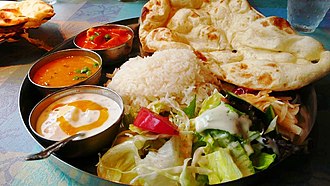Source:
ហូបបួស Vegetarianism
Vegetarianism /ˈvɛdʒətɛəriənɪzəm/ is the practice of abstaining from the consumption of meat (red meat, poultry, seafood and the flesh of any other animal), and may also include abstention from by-products of animal slaughter.
Vegetarianism can be adopted for different reasons. Many object to eating meat out of respect for sentient life. Such ethical motivations have been codified under various religious beliefs, along with animal rights. Other motivations for vegetarianism are health-related, political, environmental, cultural, aesthetic or economic. There are varieties of the diet as well: an ovo-vegetarian diet includes eggs but not dairy products, a lacto-vegetarian diet includes dairy products but not eggs, and an ovo-lacto vegetarian diet includes both eggs and dairy products. A vegan diet excludes all animal products, including eggs, dairy, beeswax and honey. Some vegans also avoid animal products such as leather (and possibly silk) for clothing and goose-fat for shoe polish.
Various packaged or processed foods, including cake, cookies, candies, chocolate, yogurt and marshmallows, often contain unfamiliar animal ingredients, and may be a special concern for vegetarians due to the likelihood of such additions.[4][6] Often, products are reviewed by vegetarians for animal-derived ingredients prior to purchase or consumption.[6] Vegetarians vary in their feelings regarding these ingredients, however. For example, while some vegetarians may be unaware of animal-derived rennet's role in the usual production of cheese and may therefore unknowingly consume the product,[4][7][8] other vegetarians may not take issue with its consumption.
Semi-vegetarian diets consist largely of vegetarian foods, but may include fish or poultry, or sometimes other meats, on an infrequent basis. Those with diets containing fish or poultry may define meat only as mammalian flesh and may identify with vegetarianism.[9][10] A pescetarian diet has been described as "fish but no other meat".[11] The common use association between such diets and vegetarianism has led vegetarian groups such as the Vegetarian Society to state that diets containing these ingredients are not vegetarian, due to fish and birds being animals.
Indian cuisine offers a wide range of vegetarian delicacies because the two main sects of Hinduism, practiced by the majority of India's population, encourages vegetarian diet. Shown here is a vegetarian thali.
A vegetarian dinner at a Japanese Buddhist temple
Vegetarian of Hinduism
ហូបបួស Vegetarianism
Vegetarianism /ˈvɛdʒətɛəriənɪzəm/ is the practice of abstaining from the consumption of meat (red meat, poultry, seafood and the flesh of any other animal), and may also include abstention from by-products of animal slaughter.
Vegetarianism can be adopted for different reasons. Many object to eating meat out of respect for sentient life. Such ethical motivations have been codified under various religious beliefs, along with animal rights. Other motivations for vegetarianism are health-related, political, environmental, cultural, aesthetic or economic. There are varieties of the diet as well: an ovo-vegetarian diet includes eggs but not dairy products, a lacto-vegetarian diet includes dairy products but not eggs, and an ovo-lacto vegetarian diet includes both eggs and dairy products. A vegan diet excludes all animal products, including eggs, dairy, beeswax and honey. Some vegans also avoid animal products such as leather (and possibly silk) for clothing and goose-fat for shoe polish.
Various packaged or processed foods, including cake, cookies, candies, chocolate, yogurt and marshmallows, often contain unfamiliar animal ingredients, and may be a special concern for vegetarians due to the likelihood of such additions.[4][6] Often, products are reviewed by vegetarians for animal-derived ingredients prior to purchase or consumption.[6] Vegetarians vary in their feelings regarding these ingredients, however. For example, while some vegetarians may be unaware of animal-derived rennet's role in the usual production of cheese and may therefore unknowingly consume the product,[4][7][8] other vegetarians may not take issue with its consumption.
Semi-vegetarian diets consist largely of vegetarian foods, but may include fish or poultry, or sometimes other meats, on an infrequent basis. Those with diets containing fish or poultry may define meat only as mammalian flesh and may identify with vegetarianism.[9][10] A pescetarian diet has been described as "fish but no other meat".[11] The common use association between such diets and vegetarianism has led vegetarian groups such as the Vegetarian Society to state that diets containing these ingredients are not vegetarian, due to fish and birds being animals.
Indian cuisine offers a wide range of vegetarian delicacies because the two main sects of Hinduism, practiced by the majority of India's population, encourages vegetarian diet. Shown here is a vegetarian thali.
A vegetarian dinner at a Japanese Buddhist temple
Vegetarian of Hinduism
Judaism in Israel
India: 500 million Vegetarians
Many people in western countries hold the misconception that vegetarians are “on the fringe” and that you have to eat meat to be healthy. This flies in the face of reality. India, the world’s second most populous country, with a population of over 1.2 billion has around 500 million vegetarians.
Many people in western countries hold the misconception that vegetarians are “on the fringe” and that you have to eat meat to be healthy. This flies in the face of reality. India, the world’s second most populous country, with a population of over 1.2 billion has around 500 million vegetarians.





No comments:
Post a Comment